
# 3182b FDC - 1998 32c Celebrate the Century - 1900s: Theodore Roosevelt
1998 32¢ President Theodore Roosevelt
Celebrate the Century – 1900s
City: Washington, DC
Quantity: 12,533,333
Printed By: Ashton-Potter (USA) Ltd
Printing Method: Lithographed
Perforations: 11 ½
Color: Multicolored
Happy Birthday Teddy Roosevelt
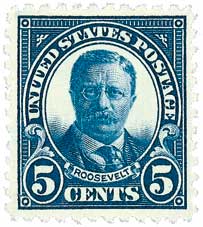
Theodore “Teddy” Roosevelt was born October 27, 1858, in New York City, the second of four children.
Roosevelt suffered from asthma and other sicknesses throughout his childhood. But he was often active and mischievous, taking great joy in activities outdoors. Roosevelt had a photographic memory and excelled in geography, history, biology, French, and German.
By the time Roosevelt was a student at Harvard, he was an accomplished naturalist, published ornithologist, and editor of The Harvard Advocate. While at Harvard and after graduation, Roosevelt wrote a book on the role of the U.S. Navy in the War of 1812. The book was highly praised and established Roosevelt as a serious historian.
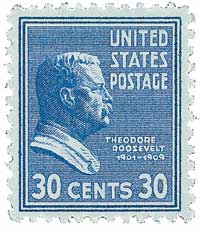
In 1881 Roosevelt was elected to the New York Assembly and quickly became a major figure in state politics and a “rising star” in the Republican Party. He served three terms, writing more bills than any other New York State legislator. A fallout during the 1884 Republican National Convention disillusioned him to party politics and he decided to retire to his ranch in the Badlands in the Dakota Territory.
Roosevelt embraced the Western lifestyle – learning to ride a horse, rope, and hunt. He also wrote three books on life there and served as a deputy sheriff. When a particularly rough winter destroyed his $80,000 investment and herd of cattle, Roosevelt moved back East to Sagamore Hill. In 1886, he unsuccessfully ran for mayor of New York, campaigning as “The Cowboy of the Dakotas.”
During the 1888 Presidential election season, Roosevelt campaigned for Benjamin Harrison throughout the Midwest. Upon his election, Harrison appointed Roosevelt to the U.S. Civil Service Commission. In that role, he fought tirelessly for the enforcement of civil service laws.
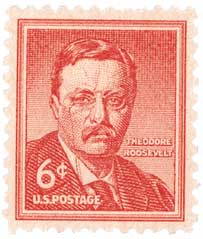
After leaving his Civil Service post, Roosevelt became president of the board of New York City police commissioners in 1895. He established new disciplinary rules, a bicycle squad, and required the use of pistols by officers. He also called for regular inspections of guns, annual physical exams, service medals, installed telephones in station houses, appointed 1,600 recruits based on their physical and mental qualifications, and put an end to corrupt practices. He made a habit of walking officers’ late night and early morning beats, to assure that they were on duty.
In 1897, President William McKinley appointed Roosevelt assistant secretary of the Navy. Ten days after the battleship Maine exploded in Cuba, Roosevelt’s superior was unconscious for four hours, making him acting secretary. Roosevelt told the Navy to prepare for war, ordered ammunition and supplies, consulted experts, and asked Congress for the authority to recruit sailors, which helped move America toward the Spanish-American War.
With America’s declaration of war the following year, Roosevelt resigned from his post to raise a group of volunteers to fight. He got cowboys from the West and Ivy League friends from New York, creating the First U.S. Volunteer Cavalry Regiment, nicknamed the “Rough Riders.” Landing in Daiquiri, Cuba, the Rough Riders marched past the 1st Infantry Division and engaged with the Spanish forces at the Battle of Las Guasimas. They forced their way through the Spanish lines, causing the enemy to retreat earlier than planned.
After Roosevelt was promoted to colonel, he led the riders on their now-famous charges of Kettle and San Juan Hills on July 1, 1898. However, malaria and other diseases took a greater toll on his men than the battle and he demanded that they be returned home. He was then nominated for a Medal of Honor but disapproved, though he was posthumously awarded it in 2001.
Returning to civilian life, Roosevelt was elected governor of New York in 1898. His sweeping attempts to rid the state of corruption and machine politics got him placed as William McKinley’s running mate in the 1900 election. Roosevelt campaigned around the country, leading to a landslide victory for the Republicans.
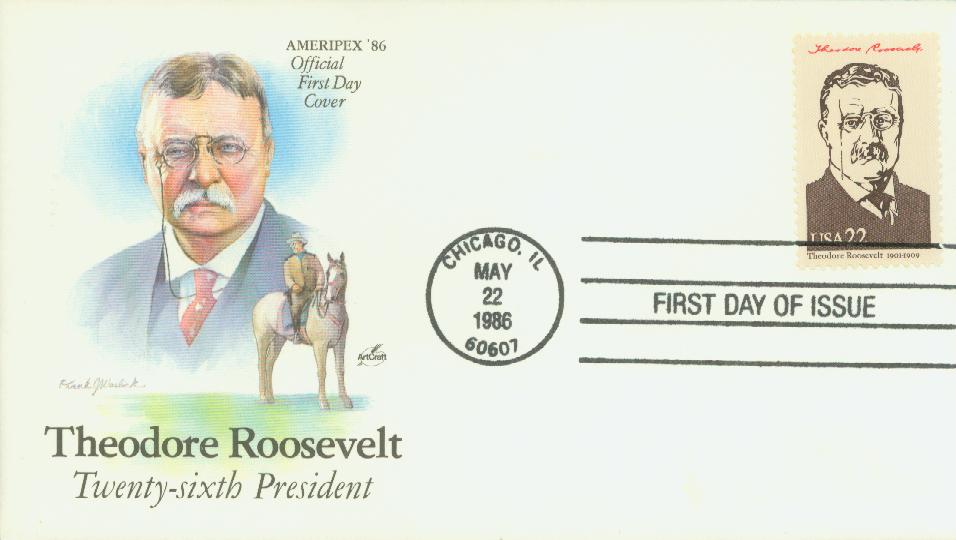
Roosevelt’s six months as Vice President were relatively uneventful. However, on September 6, an assassin shot President McKinley. At first, the doctors believed he would make a full recovery, but his condition worsened. Roosevelt was sworn-in as President at 3:30 pm on September 14. A few weeks before his 43rd birthday, he became the youngest man to ever hold the nation’s highest office.
Upon taking office, Roosevelt promised to uphold McKinley’s policies and retain his cabinet. One of his first significant acts was delivering a 20,000-word address to Congress, urging them to limit the power of large corporations (also known as trusts). His firm stance on the issue earned him the nickname “trust-buster.” Roosevelt also established the Department of Commerce and Labor, to make labor and management issues more widely known.
One of the first major obstacles Roosevelt faced came in 1902, when a coal strike nearly ended in a national emergency (as the coal was used to heat most homes). Roosevelt forced the strike to end by threatening to send in the U.S. Army to mine the coal. He then oversaw negotiations, getting the miners and owners to agree to the findings of a commission.
President Roosevelt also took strides to improve the quality of food and medicine, by pushing Congress to pass the Pure Food and Drug Act and the Meat Inspection Act. These laws required foods and drugs to be properly labeled, for meat to be inspected, and for meatpacking plants to maintain sanitary conditions.
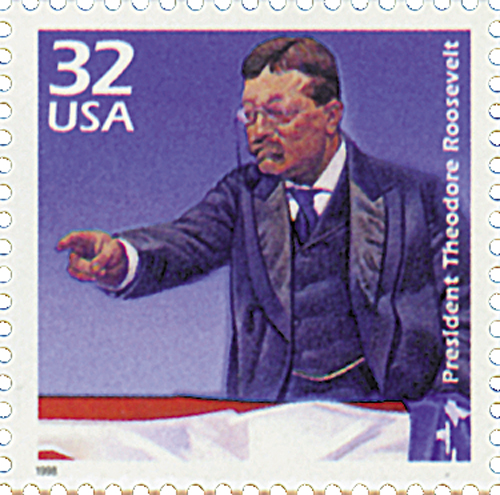
Roosevelt dedicated much of his time in the White House to protecting natural resources. He pushed for the Newlands Reclamation Act of 1902, which provided for federal construction of dams to irrigate farms. It also placed 230 million acres under federal protection. During his term, Roosevelt set aside more federal land, national parks, and nature preserves than all the Presidents before him combined. He established the U.S. Forest Service and created five new National Parks. Roosevelt also passed the 1906 Antiquities Act, under which he established 18 new U.S. National Monuments. Additionally, he created America’s first 51 bird reserves, 4 game preserves, and 150 national forests.
In 1904, the President added the Roosevelt Corollary to the Monroe Doctrine. This addition promised that the U.S. would help Caribbean and Central American countries if they could not pay their debts to European creditors. This move was particularly aimed at Germany, which was prepared to seize their ports in Venezuela. As a result of the corollary, Germany took no action and peace remained in the region.
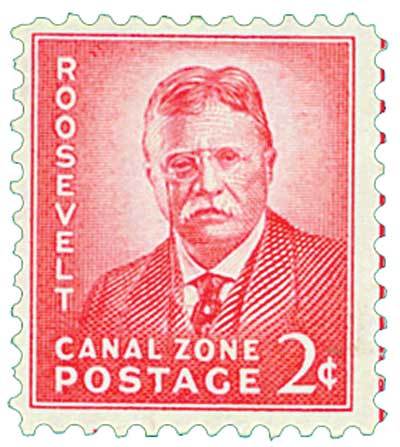
Roosevelt considered the Panama Canal to be one of his greatest achievements. Work on that began in 1903, when he encouraged the people of Panama to establish themselves as an independent nation from Columbia (which had refused to work with America in building a canal across the isthmus). Roosevelt sent naval vessels to the area, allowing the Panamanian rebels to secede without major confrontation. As a new nation, Panama sold the Canal Zone to the U.S. for $10 million. Roosevelt saw the canal as vital to protecting America’s interests and strengthening the U.S. Navy.
1998 32¢ President Theodore Roosevelt
Celebrate the Century – 1900s
City: Washington, DC
Quantity: 12,533,333
Printed By: Ashton-Potter (USA) Ltd
Printing Method: Lithographed
Perforations: 11 ½
Color: Multicolored
Happy Birthday Teddy Roosevelt

Theodore “Teddy” Roosevelt was born October 27, 1858, in New York City, the second of four children.
Roosevelt suffered from asthma and other sicknesses throughout his childhood. But he was often active and mischievous, taking great joy in activities outdoors. Roosevelt had a photographic memory and excelled in geography, history, biology, French, and German.
By the time Roosevelt was a student at Harvard, he was an accomplished naturalist, published ornithologist, and editor of The Harvard Advocate. While at Harvard and after graduation, Roosevelt wrote a book on the role of the U.S. Navy in the War of 1812. The book was highly praised and established Roosevelt as a serious historian.

In 1881 Roosevelt was elected to the New York Assembly and quickly became a major figure in state politics and a “rising star” in the Republican Party. He served three terms, writing more bills than any other New York State legislator. A fallout during the 1884 Republican National Convention disillusioned him to party politics and he decided to retire to his ranch in the Badlands in the Dakota Territory.
Roosevelt embraced the Western lifestyle – learning to ride a horse, rope, and hunt. He also wrote three books on life there and served as a deputy sheriff. When a particularly rough winter destroyed his $80,000 investment and herd of cattle, Roosevelt moved back East to Sagamore Hill. In 1886, he unsuccessfully ran for mayor of New York, campaigning as “The Cowboy of the Dakotas.”
During the 1888 Presidential election season, Roosevelt campaigned for Benjamin Harrison throughout the Midwest. Upon his election, Harrison appointed Roosevelt to the U.S. Civil Service Commission. In that role, he fought tirelessly for the enforcement of civil service laws.

After leaving his Civil Service post, Roosevelt became president of the board of New York City police commissioners in 1895. He established new disciplinary rules, a bicycle squad, and required the use of pistols by officers. He also called for regular inspections of guns, annual physical exams, service medals, installed telephones in station houses, appointed 1,600 recruits based on their physical and mental qualifications, and put an end to corrupt practices. He made a habit of walking officers’ late night and early morning beats, to assure that they were on duty.
In 1897, President William McKinley appointed Roosevelt assistant secretary of the Navy. Ten days after the battleship Maine exploded in Cuba, Roosevelt’s superior was unconscious for four hours, making him acting secretary. Roosevelt told the Navy to prepare for war, ordered ammunition and supplies, consulted experts, and asked Congress for the authority to recruit sailors, which helped move America toward the Spanish-American War.
With America’s declaration of war the following year, Roosevelt resigned from his post to raise a group of volunteers to fight. He got cowboys from the West and Ivy League friends from New York, creating the First U.S. Volunteer Cavalry Regiment, nicknamed the “Rough Riders.” Landing in Daiquiri, Cuba, the Rough Riders marched past the 1st Infantry Division and engaged with the Spanish forces at the Battle of Las Guasimas. They forced their way through the Spanish lines, causing the enemy to retreat earlier than planned.
After Roosevelt was promoted to colonel, he led the riders on their now-famous charges of Kettle and San Juan Hills on July 1, 1898. However, malaria and other diseases took a greater toll on his men than the battle and he demanded that they be returned home. He was then nominated for a Medal of Honor but disapproved, though he was posthumously awarded it in 2001.
Returning to civilian life, Roosevelt was elected governor of New York in 1898. His sweeping attempts to rid the state of corruption and machine politics got him placed as William McKinley’s running mate in the 1900 election. Roosevelt campaigned around the country, leading to a landslide victory for the Republicans.

Roosevelt’s six months as Vice President were relatively uneventful. However, on September 6, an assassin shot President McKinley. At first, the doctors believed he would make a full recovery, but his condition worsened. Roosevelt was sworn-in as President at 3:30 pm on September 14. A few weeks before his 43rd birthday, he became the youngest man to ever hold the nation’s highest office.
Upon taking office, Roosevelt promised to uphold McKinley’s policies and retain his cabinet. One of his first significant acts was delivering a 20,000-word address to Congress, urging them to limit the power of large corporations (also known as trusts). His firm stance on the issue earned him the nickname “trust-buster.” Roosevelt also established the Department of Commerce and Labor, to make labor and management issues more widely known.
One of the first major obstacles Roosevelt faced came in 1902, when a coal strike nearly ended in a national emergency (as the coal was used to heat most homes). Roosevelt forced the strike to end by threatening to send in the U.S. Army to mine the coal. He then oversaw negotiations, getting the miners and owners to agree to the findings of a commission.
President Roosevelt also took strides to improve the quality of food and medicine, by pushing Congress to pass the Pure Food and Drug Act and the Meat Inspection Act. These laws required foods and drugs to be properly labeled, for meat to be inspected, and for meatpacking plants to maintain sanitary conditions.

Roosevelt dedicated much of his time in the White House to protecting natural resources. He pushed for the Newlands Reclamation Act of 1902, which provided for federal construction of dams to irrigate farms. It also placed 230 million acres under federal protection. During his term, Roosevelt set aside more federal land, national parks, and nature preserves than all the Presidents before him combined. He established the U.S. Forest Service and created five new National Parks. Roosevelt also passed the 1906 Antiquities Act, under which he established 18 new U.S. National Monuments. Additionally, he created America’s first 51 bird reserves, 4 game preserves, and 150 national forests.
In 1904, the President added the Roosevelt Corollary to the Monroe Doctrine. This addition promised that the U.S. would help Caribbean and Central American countries if they could not pay their debts to European creditors. This move was particularly aimed at Germany, which was prepared to seize their ports in Venezuela. As a result of the corollary, Germany took no action and peace remained in the region.

Roosevelt considered the Panama Canal to be one of his greatest achievements. Work on that began in 1903, when he encouraged the people of Panama to establish themselves as an independent nation from Columbia (which had refused to work with America in building a canal across the isthmus). Roosevelt sent naval vessels to the area, allowing the Panamanian rebels to secede without major confrontation. As a new nation, Panama sold the Canal Zone to the U.S. for $10 million. Roosevelt saw the canal as vital to protecting America’s interests and strengthening the U.S. Navy.













